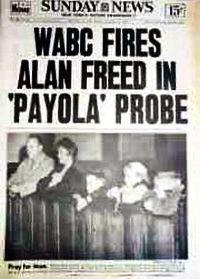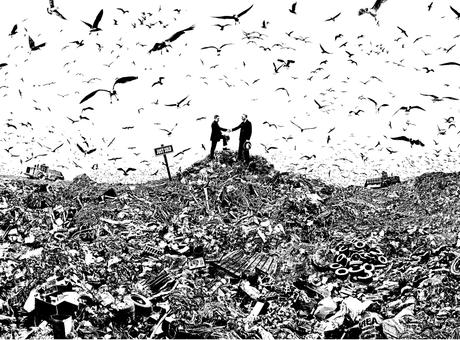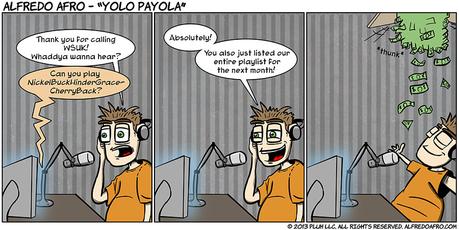If you’re reading this you’re probably, at least to some degree, a ‘music person’ so you probably already know about payola, the practice of labels and promoters paying radio stations to play the music they are tasked with working with. The term gets its name the famous 1959-1960 Congressional Payola Investigations that brought broadcast legends like Dick Clark and Alan Freed under fire. Many musicians optimistically think that today this is no longer the case. I’m here to tell you that, unfortunately its seems like payola is more prevalent than ever.
Now in some situations this manifests itself differently – for example Limp Bizkit rose to popularity through a form of payola where the label said ‘This song has been sponsored by Sony Records’ or something along those lines and got massive airplay. After all – if a song is played enough on the radio it will get popular – that’s the unfortunate reality. Nowadays this is increasingly frowned upon, so many labels try to use independent radio promoters in order to put a layer of separation between themselves and the radio stations in order to help hide their crimes – nevertheless every few years the major labels end up having to pay fines in the seven figure range.

Of course – they still do it – these fines aren’t nearly big enough to turn them off of radio pushes – pushes that help to put food on their tables. In fact – I can almost guarantee you that the major labels budget into their radio campaigns find for payola. Radio folks are desperate for any money that they can get at this point, so the incentive for payola is higher than ever. The thing is – radio people will still have power as long as trade magazines like FMBQ and Billboard still report radio rankings. And while radio play doesn’t really translate into record sales, the perceived popularity given by dominating these charts usually translates into actually popularity elsewhere.
Of course – as I’m sure I’ve touched on before on this blog, radio play isn’t really going to help most independent musicians. Sure being featured in a CMJ showcase is helpful and if you can find a cool DJ who will help get some of your music on alternative or specialty shows that’s certainly awesome – but until you’re making thousands on merchandise sales it probably isn’t going to make sense for you to buy in to the whole radio rigmarole. Sure college radio broke Nirvana, but that was in 1990 – nowadays you would be hard pressed to find kids listening to college radio. So if you’re not expecting to get tens of thousands of plays it’s not likely that you’re going to get that huge a boost from a paid targeted campaign anyway. If you really want to profit off of radio work then you are going to need to focus, for a long time at least, on local specialty stations.

Radio, in America at least, is a very sick and twisted format. ClearChannel – the company that owns the majority of commercial stations in the US (You can see their logo on the bottom of almost any billboard) is perhaps most responsible for this. Their founder Lowry Mays was even quoted as saying, “If anyone said we were in the radio business, it wouldn’t be someone from our company. We’re not in the business of providing news and information. We’re not in the business of providing well researched music. We’re simply in the business of selling our customers products”. With quotes like this in mind I think that you can quickly start to realize why most commercial formats are as good as dead for independent musicians.
With noncommercial radio a payola induced zombie, ClearChannel and other commercial stations a impenetrable juggernaut and college radio run by… college kids I think it’s easy to see that radio isn’t in a great place right now. Then of course there’s internet radio – but even that hasn’t done much outside of podcasting (Which I love) This can also help to generate a more targeted, active interest in your music. I think that nowadays the best thing to do is to get your music on every curation service possible and make sure to have a massive web presence. Radio is a scary place – but if you do have the funds to be successful then by all means go ahead.

I have always thought it was funny that so many of us want to get into the radio when most independent musicians I know grew up hating the stuff they played on the radio. It’s the sort of circular bite-you-in-the-ass catch 22 that reveals the internal hypocrisy of the music industry. Of course I get why they want to be on the radio – hell I want to be on the radio. Yet at this point it seems like it isn’t a realistic option for anyone who isn’t on top of the charts. So what else can we do other than back off and recalibrate our promotional campaigns? Sometimes it’s not a matter of trying harder but rather finding a new path.
Independent Music Promotions’ (www.independentmusicpromotions.com) revolutionary music PR campaigns are the most effective in the industry. Submit your music to us today.

